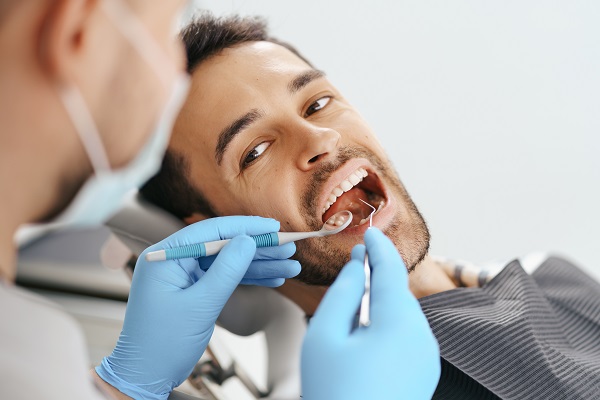When and Why They Are Tooth Extractions Needed?
Regardless of one's oral health care routine, a person may need a some point in their life. The first step involves a general dentist examining your teeth to determine which tooth, or teeth, needs extraction. Whether a tooth is infected, impacted, or growing at a crooked angle, tooth extractions are an essential and effective procedure for providing lasting relief and oral health.
When a tooth extraction is necessary
Practicing good oral health on a daily basis can help keep natural teeth intact. However, after some years, undetected dental problems can arise. Infected or injured teeth may require a tooth extraction from a general dentist to relieve pain and benefit their oral health. Here are the times when tooth extraction is necessary:
- Severe dental infection or injury
- An impacted wisdom tooth
- Baby teeth that do not fall out in time
- The patient's mouth does not have enough room for the teeth
In all these cases, a tooth extraction will help to remove the issue and alleviate pain. Contrary to popular myths about tooth extractions, patients will not feel anything during the procedure and no longer struggle with the pain after recovery.
Why a tooth extraction is necessary
An individual may need a tooth extraction for either baby or adult teeth. Some procedures only require extracting one tooth, while others may require removing multiple. There are multiple reasons for why a tooth extraction is necessary, including:
Treating periodontal disease.
Gum infection can eat away the gum ligaments and other dental structures. This will result in the teeth loosening if the dentist does not extract the periodontal disease and clean the infected gum tissue. By removing the infected tooth, the dentist will clear the infection and prevent the issue from spreading to other teeth.
Keeping the rest of the mouth healthy.
There are many cases where tooth decay remains undetected for years. Eventually, there will be signs of decay damaging the outer and inner parts of the tooth. If the dentist does not remove the decay and infected tooth, it will spread to other teeth and the mouth. This can lead to more severe oral health issues and pain if left untreated.
Relieving pain from an impacted wisdom tooth.
A common type of tooth extraction is a wisdom tooth extraction. The wisdom teeth are the back teeth, or molars, in the mouth. An impacted wisdom tooth is difficult to clean, allowing bacteria to form plaque and cause infection. Over time, the patient will feel immense pain and require an extraction for permanent relief. In other cases, a wisdom tooth can also emerge from the gums at a crooked angle, causing discomfort when it collides with the other teeth.
Extracting a tooth with a severe injury.
The dentist will check the patient’s teeth after the injury or accident. In some cases, dental X-rays will be necessary to confirm the degree of damage. The dentist will remove the tooth if the fracture or breakage has already reached the jawbone and is beyond saving. Following the extraction, the dentist will recommend an effective replacement option for the tooth.
Preparing for a tooth extraction
The patient must prepare well for the consultation and the procedure itself. Patients should be ready to review their medical history, such as their oral and overall health. This includes past health conditions, allergies, surgeries, current medications, and more. During this consultation, the dentist will also address any questions or concerns the patient has.
The patient will not feel anything during the procedure and, in some cases, may even be sedated. The dentist will review the details with the patient to ensure they know what to expect. The patient must refrain from eating about 12 hours before a tooth extraction to help prevent nausea during and after the treatment. Patients should also refrain from smoking 12 hours before and 24 hours after the surgery.
The patient should also have a ride home set up following the procedure. The dentist can also explain any dietary restrictions following the procedure, including avoiding certain foods and not drinking through a straw. These measures will ensure an efficient recovery time so the patient can return to their daily routine as soon as possible.
Call to Learn More Today
This invasive procedure is important in maintaining your dental and general health. While it can be scary for those unfamiliar with surgery, understanding the tooth extraction process can help to ease tensions. Our team can help determine if you or a loved one needs a tooth extraction before going over the details during an appointment.
Request an appointment here: https://aestheticsmiles.com or call Aesthetic Dentistry of Noe Valley at (415) 493-9143 for an appointment in our San Francisco office.
Check out what others are saying about our dental services on Yelp: .
Related Posts
A tooth extraction might be necessary for multiple instances. The tooth comes out of the patient’s mouth because of an infection or other reasons. A dentist tries to keep the teeth intact as long as possible, but not every tooth can be saved. Keep reading to learn more about why you might need an extraction.Tooth…
Tooth extraction can seem to be hard to recover from, but there are plenty of ways that a person can take care of their mouth after a tooth has been extracted.With the help of this article, we will discuss a few ways that someone can take care of their mouths after they’ve had a tooth…
What is an impacted tooth? We get this question from time to time as people suffer from tooth or jaw pain. Sometimes, this pain is the result of an impacted tooth that does not grow in properly. An impacted tooth can grow in sideways, not fully break through the gums or comes in crooked to…
Wisdom teeth cannot fit in the mouth. Four of your adult teeth are wisdom teeth. These teeth erupt after the second molars are already set in the back of the mouth. Because of this, wisdom teeth do not erupt the right way. Some of them cannot even break through the gums. If you want to…


